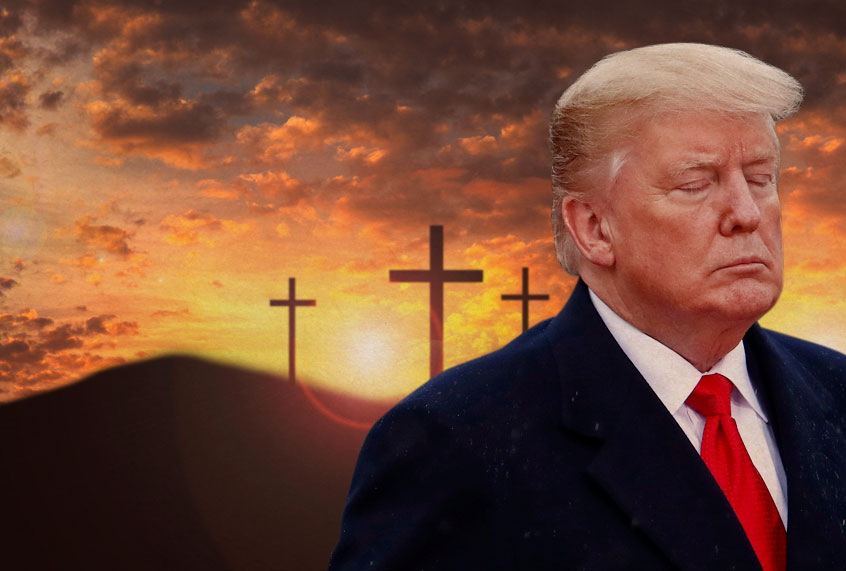It’s time for journalists and pundits to get over their fantasy that white evangelicals will someday grow a conscience, stop voting for Republicans, and start voting for the ostensible Christian values of charity and love. This contradiction, between the supposed white evangelical commitment to morality and their tendency to vote for politicians who snatch food from the hungry and wreck the planet for future generations, has long bedeviled many political observers. But this collision between stated values and actual values grew even more ridiculous when white evangelicals flocked to chronic adulterer Donald Trump, despite spending decades piously declaring that they had to vote Republican because of their views on sexual morality and marriage.
Going into 2018, we were once again subject to the hope that white evangelicals — especially younger folks and women — would be disgusted after two years of Trump’s corruption and brazen immorality. This hope led, unfortunately, to misleading articles that used anecdotal evidence to suggest that a significant number of conservative Christians would turn against Republicans at the polls. The New York Times was especially invested in this idea that there was likely to be a major shift in the voting behavior of self-identified white evangelicals.
“Young evangelicals are questioning the typical ties between evangelicalism and Republican politics,” Elizabeth Dias wrote in the New York Times before the election.
“Beto O’Rourke May Benefit From an Unlikely Support Group: White Evangelical Women,” blared the headline on another Dias story.
In July, Dias was promising that “the Trump presidency does not inspire lockstep allegiance among evangelicals” and that these religious conservatives were “especially concerned about the administration’s stance on immigration and race,” as well as about Trump’s sexual immorality.
The New York Times even gave a coveted spot on “The Daily” podcast to Dias, to promote this idea that we might see a large shift to the left among white evangelicals.
Despite all the hype, exit polling now indicates that 75 percent of self-identified white evangelicals voted Republican in 2018, while only 22 percent voted for Democrats. Yes, that undeniably represents a shift from 2016, when 80 percent voted for Trump and only 16 percent for Hillary Clinton, but it’s a pretty underwhelming shift in the face of all this hype. Nor were these voters so disheartened that they stayed home. White evangelicals had high turnout this year, and those Republicans who held onto their seats, or won Senate races in red states, owe that bloc for their victories.
After the election, researchers Jeremy Castle, Ryan P. Burge and Paul A. Djupe wrote an article for Vox explaining that “young evangelicals are quite similar to older evangelicals” and that more conservative leanings “among 18- to 29-year-old evangelicals have remained nearly constant since 1990, though with a demonstrable conservative uptick in 2016.”
While there has been some liberalizing of attitudes about same-sex marriage within this group, the researchers found this tends to occur among “low-commitment evangelicals (those who attend church, pray, and look to religion for guidance on day-to-day matters less).”
None of which should be take to mean there is no hope when it comes to young people raised in white evangelical families. But that hope shouldn’t rest on the belief that they will transform their sexist, racist communities into ones that have more humanitarian — dare one say, more Christian — beliefs. Instead, the focus should be on those who grow up in these faiths and choose to leave them as their personal values become more progressive.
As I reported for Salon in May, research shows that the real trend is not in young white evangelicals who choose to stay in their churches but leave the Republican Party. Instead, the trend is young white evangelicals leaving the church altogether, and often leaving the GOP at the same time. Research shows a “backlash effect,” in which the more the religious right gets involved in politics, the more younger congregants are likely to throw in the towel and leave both the church and conservative politics behind.
The number of white evangelicals is shrinking, while the number of religiously disaffiliated people is growing. This suggesting that many people are simply quitting organized religion altogether, even if they may maintain some private spiritual practice or beliefs.
The upside of this is that young people who leave the church are far more likely to end up voting for Democrats. In fact, progressive views are likely driving them out of the churches to begin with. The downside is that the churches are, if anything, likely to become more right-wing and more reactionary, and no number of gauzy New York Times profiles of a few liberal outliers is likely to change that.
None of this should be especially surprising, however. Evangelical Christianity, at least among white people, has long been just as much a sociopolitical phenomenon as a theological movement. As uncomfortable as it may be to confront this reality, for many people it’s more about expressing a kind of white Christian nationalism than it is about following the word of Jesus Christ, which could be accomplished through any number of sects and denominations that aren’t so closely associated with right-wing politics. The religious right has historically existed to resist desegregation and feminism, to romanticize the idea of patriarchal families, and to assert that those white male family leaders should also be leaders of society.
For people with no investment in those ideals, there’s really no reason to be part of those churches. That’s why people who reject conservative politics mostly end up leaving their churches rather than trying to change them. Conservatism is the point of this faith. Convincing evangelical churches to give that up makes about as much sense as trying to get them to stop stocking Bibles in the pews. White evangelicals can change, to be clear. But usually not without giving up that specific identity.


